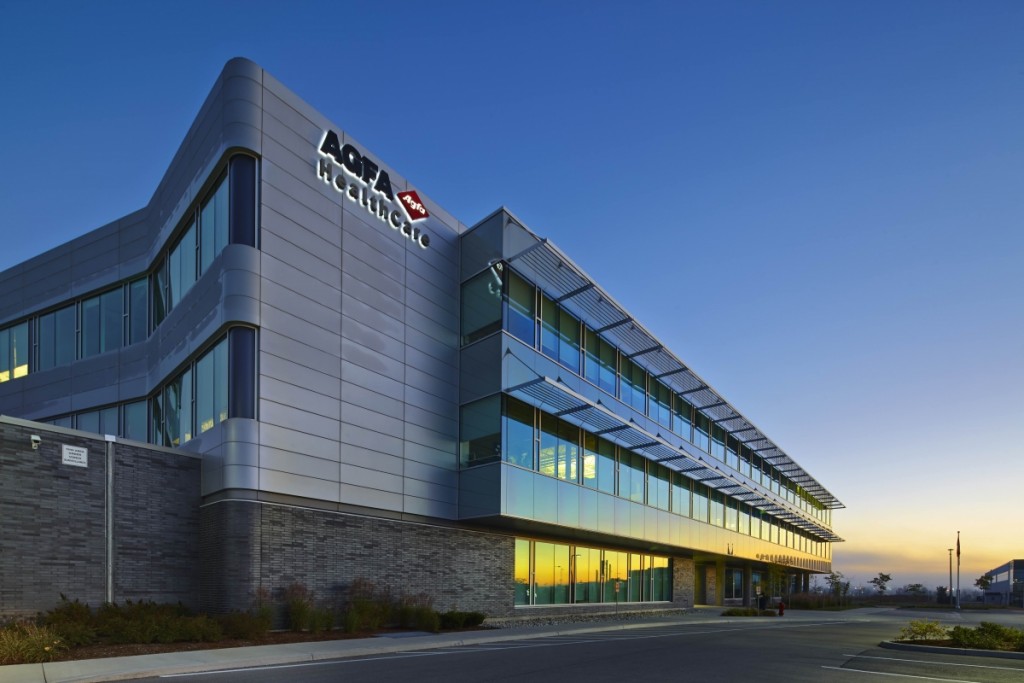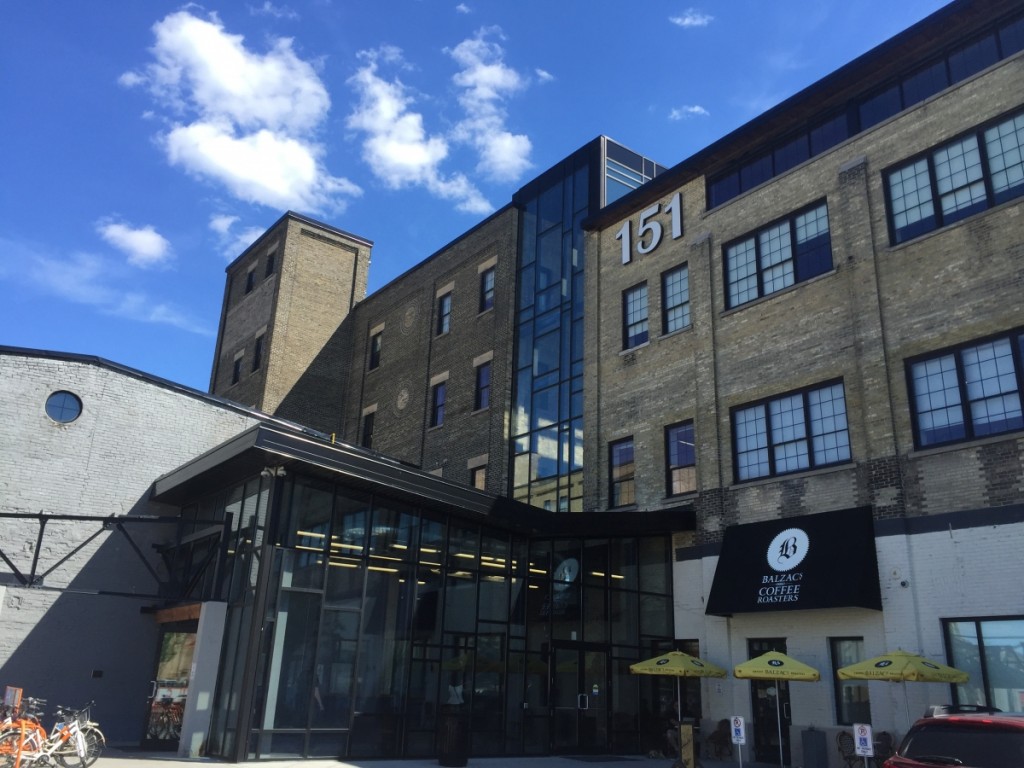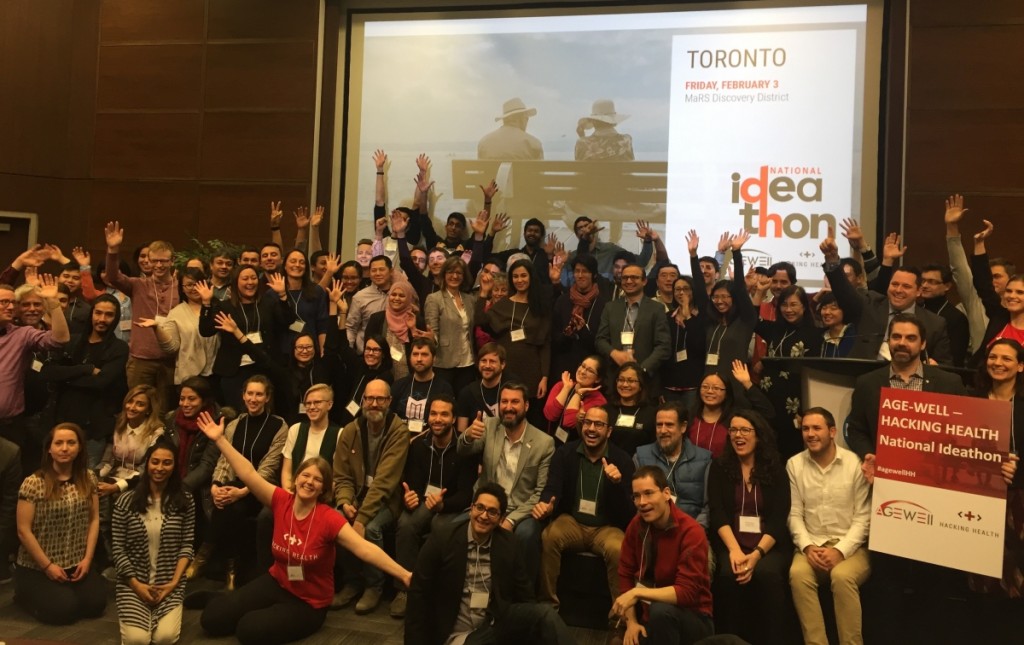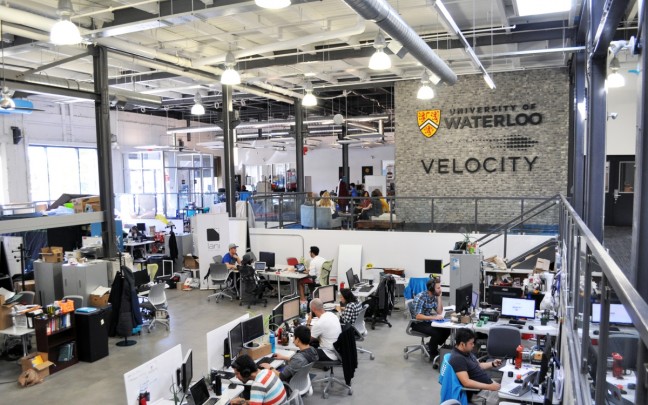“What we have in this community in KW [Kitchener-Waterloo] and in Canada is equivalent of capturing lightning in a bottle,” described Google Canada’s Managing Director, Sam Sebastian, opening the Go North event.
Health ideation in Waterloo Region
“Outside Silicon Valley the Toronto-Waterloo corridor represents the highest concentration of start-ups on the planet and it is the sense of community and shared ambition that sets us apart,” Sebastian added.
The start-up ecosystem has spawned 2,299 start-ups, attracting over $890M in private investment according to Communitech. There are almost weekly announcements in the press about ribbon-cutting expansions at incubators and new collaborations. The intellectual capital departing Blackberry has also further stimulated the rise of the tech sector in the Waterloo Region.

One of MEDEC’s members in the Region is Agfa HealthCare, whose largest global healthcare R&D, sits across from The Accelerator Centre in the David Johnston Research & Technology Park. Karin Dobbs, R&D Manager at Agfa HealthCare, explains,
“The move to the Research and Technology Park was made in collaboration with the University of Waterloo and the two organisations have a close relationship.”
The University of Waterloo (UoW) is invested in incubator programs through the Velocity Garage. Moreover, the Accelerator Board includes the VPs of Research from the Universities of Guelph, Laurier, Waterloo, and Conestoga College. Laurier’s Launchpad program is also centred inside Communitech. The new Lazaridis Research Institute for the Management of Technology Enterprises Scale Up Program had its first cohort starting this year, and they are currently recruiting for the second cohort. The region would benefit from a full medical school to build upon the Michael G. DeGroote School of Medicine, which is the Waterloo campus of McMaster University.
Integrating with the healthcare fabric
Elliot Fung, Director, Innovation and Strategic Partnerships at Waterloo-Wellington Local Health Integration Network (WWLHIN), describes the region as “Go North Canada, The Innovation City, The Start-Up City; these are monikers that are being used to define the thriving local innovation and technology culture right here in our community” in his recent guest blog post on Health Technology Innovation
An evolving role for MEDEC
New technologies are increasingly coming from start-up incubators outside the internal R&D structure of the global Medtech players. There is a hot-bed of such healthcare innovation in the Waterloo region, MaRS Discovery District, and elsewhere in Canada.
MEDEC is the national association created by and for the Canadian medical technology industry. It has much to gain and offer from a stronger collaboration with the technology start-up incubators in the Waterloo Region; such as Communitech, Velocity Garage, Accelerator Centre, Launchpad, 44G or Open Sky Incubator.
“I am sure other MEDEC members have a variety of innovative ideas and needs that they can bring to this forum of Hacking Health and the Waterloo Region community to challenge more innovation. This would stimulate further growth, new and improved products, improved services and improved healthcare. The innovation ecosystem is not a fixed size pie. The more organisations that get involved; the richer and larger the pie becomes and everyone benefits,” says Agfa HealthCare’s R&D Manager.
MEDEC is beginning to work with Elliot Fung as part of a new Hospital-to-Community task force.
“I’m excited to be working with them to advance both MEDEC and the LHIN’s objectives in this space. I have lots to say about how our ecosystem can and should be used to leverage growth opportunities in the industry,” said Fung.
The UoW Hack4Health 2.0 and Hacking Health Hackathon have recently focussed on Multiple Sclerosis, Alzheimer’s and related dementia, brain health, aging, and wellness. These events complemented the Health Tech Collision Day at Communitech and other events hosted by AGE-Well and Grand River Hospital.

From ideation to market
Agfa’s presence in the Waterloo Region began as a collaboration with Mitra, a three-person start-up that was one of the first companies to build a Picture Archive Communications System (PACS). Agfa subsequently acquired Mitra in 2002.
Dobbs elaborates on how proximity to the Waterloo Region talent pool provides a symbiotic relationship.
“We hire co-op students on a continuous basis from University of Waterloo, Wilfred Laurier, and Conestoga College. We put them to work on our current projects as developers, testers or tech writers and they contribute directly to the products and in turn the students have an opportunity to learn from seasoned professionals. The co-op students make a difference. Many of our full-time staff started with us as co-ops. It is an excellent recruitment ground.”
The hacking mentality
Again, our story returns to Agfa, who were the headline co-sponsor of the November Hackathon in Kitchener.
“Agfa has been involved with Hacking Health since they started up, we hosted one of the early cafés and have presented at Hacking Health events,” says Dobbs. “We need to be open to looking outside our bubble and be involved in these innovation initiatives. It helps us become more innovative. We benefit from the collaboration with Hacking Health in many ways.”
Hacking in healthcare has been a new hot topic, yet, being confused by the word hacking is understandable. Author, Scott Brinker portrays hacking as inventive, building through agility, transparency, collaboration yet steered by strategy.
Hacking Health is a Montreal-based organisation that has spawned a global movement to bring together healthcare practitioners, technologists, and entrepreneurs to solve healthcare problems.
“Hacking Health is about breaking down barriers to innovation in healthcare, and we mean it. This is the last frontier; this is the last industry that yet has to be transformed by the agile approach and digital technologies. Hackathons are ways to demonstrate that a lot can be achieved when people work collaboratively together, building solutions rapidly and with an agile approach. We hope to inspire enterprises and institutions to transform healthcare,” says Luc Sirois, co-founder, and leader at Hacking Health.
Agfa has been an active participant in the KW Hacking Health cafés.
“We support the healthcare innovation sector in the region and can benefit from these initiatives both directly and indirectly. Agfa participants have the opportunity to share ideas and learn from others; look at problems with the insight from people with different backgrounds. That can help us take our ideas in new directions. There is also the possibility that small companies that spring up from these initiatives eventually grow into potential partners that we can collaborate with. And it is always stimulating to support creative initiatives that grow healthcare innovation overall.” Dobbs added.
Fostering a mentoring culture
The success of the incubators and hackathons is dependent upon the mentoring support of established business leaders, experts, non-profit co-sponsors and patients with lived experience.
Karla Boluk, Professor at the Faculty of Applied Health Sciences and Hack4Health (H4H) co-organiser described the essence of this H4H in driving societal impact.
“The engagement of persons with lived experiences, non-profit societies, healthcare professionals and mentors underlies again why H4H is so successful.”
Google Canada’s Sam Sebastian interviewed on CBC Metro Morning commented that while we have great product innovators in Kitchener-Waterloo, we have a void of strategic commercialisation expertise.
Sebastian’s comments help demonstrate that through the open, collaborative, multi-disciplinary teams that epitomises the hacking mentality we each have a role and can benefit. The Waterloo Commercialization Office (WatCo) offers commercialisation services and expertise. It both supports and refers to other ecosystem partners including the Velocity Garage, Commuitech and Accelerator Centre.
“Agfa HealthCare is a leader in innovation, and if we can support others to be innovative in the healthcare sector then everyone benefits,” concludes Dobbs.

Then, like Agfa, you may be surprised what you learn and who you meet by attending these hacking events. We should expect a year of more announcements coming out of the Waterloo Region.
READ MORE FROM OUR HACKING HEALTH SERIES
Featured image courtesy of Velocity Garage/ Communitech. Agfa HealthCare photograph by Shai Gil Fotography with permission.

